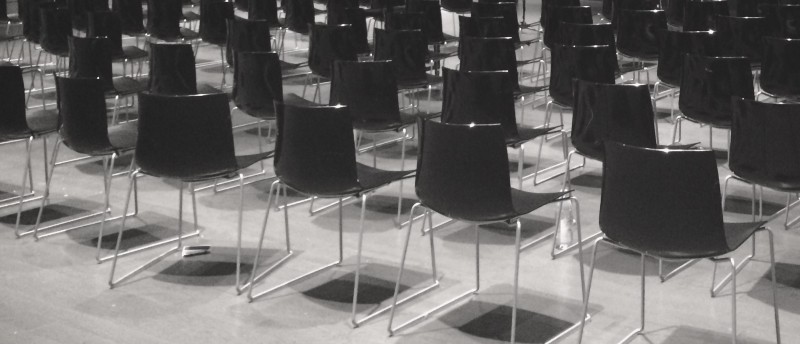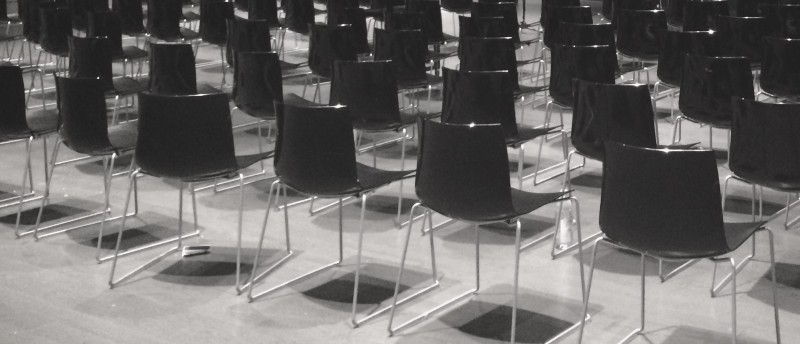by Jen Weber
How to Grow (and Save) Your Favorite Tech Meetup

Hey meetup facilitators, friends, and future leaders! Do you want more people to show up to your tech event? Or at least the same number of people? Here are some ideas to try! These tips are based on observations of Boston’s meetup culture and my experience running a group focused on Ember.js (a front-end framework).
1. Don’t just ask for new speakers — create them
While Boston Ember is pretty steady, I’ve seen other meetups struggle to find speakers. As a facilitator, it’s my responsibility to curate a variety of talks, both by topic and experience level. To achieve that, I wanted to help bring in new speakers. I needed an enormous amount of cajoling to give my first tech talk, and I can’t cajole attendees at scale, so what can be done?
First, make an event of it! Find an experienced speaker who will answer public speaking questions. You could also assemble a panel. Check out the results of our attempt here, as presented by Stephen Vance. The audience was 100% captivated.
He asked the attendees which category of information they were most interested in:
- choosing topics
- preparation
- delivery
- follow on (handling audience questions)
- remote presenting.
Then, based on audience vote for the focus, Stephen took Q&A for the most popular categories.
Second, follow up. Set aside a slot for a new speaker. Advertise it that way. Many potential speakers may believe that they need to be “experts” or that someone else is more worthy. Help them overcome imposter syndrome by extending an invitation.
2. Avoid lengthy product pitch talks
Product pitches kill tech meetups. If you don’t take steps to cultivate new speakers, your only volunteers may be people who have something to sell. Your devs will get bored of sales pitches, and they’ll stop showing up.
Here’s the litmus test for whether it’s a product pitch. Ask the potential presenter,”What will the audience take away from the talk? What will you teach them?” If it’s teaching about a business use case, the company, the industry and so on, offer them a spot for a lightning talk, ten minutes or less.
I was a salesperson before I became a developer, and I can empathize with the product pitch speakers. But be firm. You owe it to your attendees. If the speaker shares more than a product pitch, you can invite them to speak again for a longer time slot.
3. Run a raffle at the end
Every month, I go to She Geeks Out, an amazing event run by some women who are real pros at community engagement. Every month, they do a raffle at the end of the evening, and the energy it brings to the room is incredible. People stay until the end, they cheer each other on, and no speaker is ever confronted with “So, I guess that’s it for questions. Bye, have a good night.” Instead, it’s “Who’s ready to win tonight!?!? It’s raffle time.”
At the end of the day, our animal brains love the chance to win a prize.
So, I tried this out for one of our special events, using some Ember swag. Because I’m a nerd, I printed out some Ember API methods and wrote a script to select them at random. Even the people who were already wearing some swag were intent on winning.
You don’t have to spend a ton of money either to add some magic to your event. Think of it as the cost of pizza for just one more attendee. Buy $40 of clearance stuff from ThinkGeek and you’re good to go for the year.
4. Be in cahoots with other meetups
In 2017, the Boston tech meetup scene suffered some serious blows. Many popular groups went poof, and seemingly the number of venues willing to host tanked. To form a support network, some local meetup organizers created Boston JavaScript. It is a Slack organization where local groups could share and grow together. Then, they invited every group and their organizers to join.
It’s important for developers to consider tools outside their wheelhouse. We all have a lot to learn from each other! The shared space enables us to share event announcements and collaborate.
I also reached out to some people in my Ember network to ask for advice. I spoke with other local members, past leaders, and facilitators in other states. They shared ideas I had never seen in action before.
5. Every month, take action to build sustainability
So what killed the Boston meetups in 2017? My guess is that the organizers needed a break, which is natural, but no one else was ready to take over.
It’s important to take steps today to prepare for when you and your partners will inevitably be moving on to something else. Don’t wait until that time hits.
I’m still exploring this myself, but here’s what I’ve gathered from other meetup leaders:
- Ask for help, even when you don’t need it. Your helpers will become the future leaders.
- Form a coalition. I recently heard of a meetup run by 6 people. It is very stable.
- Suggest many ways to help. Social media, livestream, and event advertising are all good ways for people to pitch in. Volunteers don’t need to be comfortable in front of a crowd.
- Let go of some control. Share responsibilities with your co-facilitators. Accept that they will do things differently than you would.
- Rotate the emcee, at least for certain sections of the event. People besides you need practice before they’d ever agree to be a copilot or take over facilitation.
- Get the attendees involved as participants. Ask them to be speakers and ask them for feedback. Have a session where people can propose topics they’re interested in hearing about. If people show up and leave without contributing, you may become the only one who cares enough to put in the work. Make it everyone’s baby.
In closing…
When I first stepped up to help run a meetup, I was terribly worried. I was afraid that no one would show up, that I wouldn’t be able to find venues/sponsors, that people would stop coming… that I wasn’t good enough. I got on the phone with the facilitator of the NYC Ember.js, Luke Melia, and I asked him a thousand anxiety-fueled questions.
He said something like this:
Before I answer any of these questions, I want to make one point. You are going to have so much fun! Running a meetup is an incredibly valuable experience. You will learn so much.
He was right.
Jen Weber builds apps for science at BioBright. She’s a contributor to Ember.js, a front end framework that comes with “batteries included” for better developer experience and productivity. She works to transform tech into an industry that welcomes new people.
